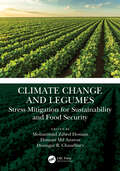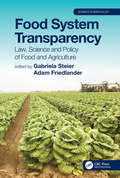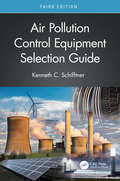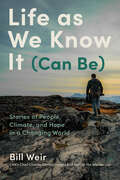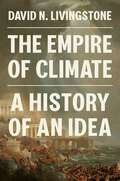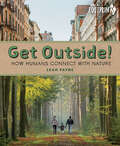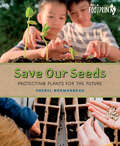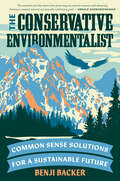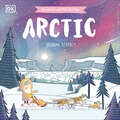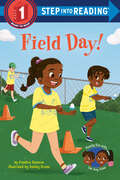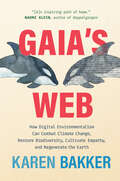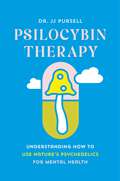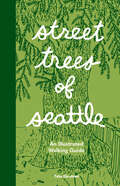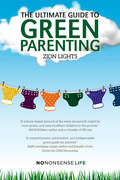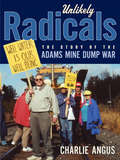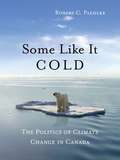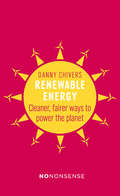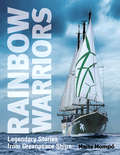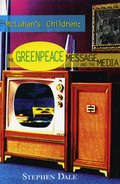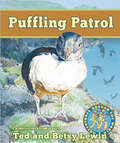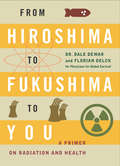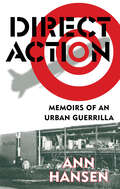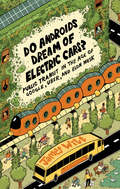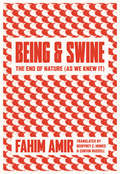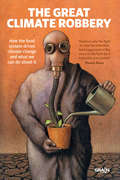- Table View
- List View
Climate Change and Legumes: Stress Mitigation for Sustainability and Food Security
by Mohammad Zabed Hossain Hossain Anawar Doongar R. ChaudharyGlobal climate change has created unprecedented challenges for human civilization due to its widespread adverse consequences, including a reduction in crop yield and threatening food security across the globe. Among the crop plants, legumes have great potential for ameliorating global warming since they can reduce carbon emissions by lowering reliance on the application of chemical fertilizers, by increasing nitrification and carbon sequestration in soil, and by providing protein-rich diets to both humans and livestock. This book identifies the extent of climate-induced stresses on legume plants and focuses on achieving food security through sustainable agricultural practices.This book compiles recent research findings and reviews on climate-related problems, the potential of legumes in ameliorating the impacts of climate change, as well as better management of agricultural land and practices for achieving environmental sustainability and food security.This book will serve as guidelines for scientists, agricultural practitioners, and policymakers working to achieve food security and better management of climate-induced stresses in agricultural interventions. It will also be useful as a reference book for researchers and students of both graduate and postgraduate levels. Furthermore, this book will provide enhanced knowledge about the mechanisms of yield and stress tolerance of legumes as well as developing climate-smart crops and improving cropping systems for a sustainable environment and food security. Features of the book Reviews trends of global climate change and its consequences for food security across the continents Identifies the challenges and scopes of cultivating legumes in achieving food security in the context of global climate change Focuses on the improvements of legume production through conservation approaches in agricultural practices and modern techniques, including omics-based breeding, biotechnology, genetic engineering, and rhizobium technology Discusses the sustainable amelioration options for soils affected by climate-induced stresses Cites examples of applications of rhizobium technologies in reducing greenhouse gas emission Describes pathways associated with yield, resistance, and tolerance of legumes to climate-induced stresses
Food System Transparency: Law, Science and Policy of Food and Agriculture (Advances in Agroecology)
by Gabriela Steier Adam FriedlanderThis book brings together an international group of agriculture and food lawyers and scientists to define the field of Food System Transparency in three parts: the big picture, food safety and health, and the global view. Each part adds to the whole but zooms in through a unique lens. Investigating social, economic, political, scientific and legal frameworks, this comprehensive volume addresses topics such as food authenticity, agroecological evaluations, and consumer protection. Interwoven themes of transparency contextualize concepts of food safety, information sharing and regulatory opportunities at a local and global scale. Editors’ notes provide blended legal and scientific commentary to facilitate further discussion and context within the classroom. Advantages of this volume include: Chapters written by foremost international experts in their fields Editors’ notes written for classroom use and background information Figures and tables providing illustrations of important concepts Case studies delivering practicality and in-depth analysis to current events A special chapter on COVID-19 and its implications for the food system This book is important reading for graduate-level students, legal scholars, nonlegal academics, advocates for food system transparency and resilience, agroecology and environmental conservation, and practitioners in any cross-disciplinary areas relating to food policy. It will be of interest to all those who seek to deepen their understanding of the concepts and trends surrounding the information that centers around our food system, both domestically in the United States and the European Union, as well as in many major trading nations such as China.Check out the Support Materials tab on www.routledge.com/9780367440367 for a short video previewing some the key themes in the book.
Air Pollution Control Equipment Selection Guide
by Kenneth C. SchifftnerThis new edition of Air Pollution Control Equipment Selection Guide builds upon the successes of previous editions that developed a detailed discussion on various technologies used for air pollution control. This book covers a wide range of equipment and provides a good overview of the related principles and applications. A particularly valuable feature are the practical examples, not commonly available in other books. Based on the author’s fifty years of experience in applying and operating air pollution control equipment, this book provides easy-to-read information on basic air pollution control technology and is the quintessential resource for the busy engineer and for those who do not have formal training in air pollution control.FEATURES OF THE THIRD EDITION Uniform and consistent applications information for comparing the effectiveness of different technologies. Provides answers to questions about how to reduce operating costs and how to achieve peak performance. Concise descriptions of each equipment with diagnostics and testing suggestions. New chapters on optimization techniques that help readers deal with different types of hardware for better performance and efficacy.
Life as We Know It (Can Be): Stories of People, Climate, and Hope in a Changing World
by Bill WeirAward-winning journalist and CNN chief climate correspondent Bill Weir draws on his years of immersive travel and reporting to share the best ideas and stories of hope and positivity from the people and communities around the world who are thriving in the wake of climate change, and what we can learn from them to build a more promising future.While reporting from every state and every continent, and filming his acclaimed CNN Original Series The Wonder List, Bill Weir has spent decades telling the stories of unique people, places, cultures, and creatures on the brink of change. As the first Chief Climate Correspondent in network news, he’s immersed in the latest science and breakthroughs on the topic, while often on the frontlines of disasters, natural and manmade.In 2020, Bill began distilling these experiences into a series of Earth Day letters for his then-newborn son to read in 2050, to help him better understand the world he will have grown up in and be better prepared to embrace the future. Bill’s work and his letters were the inspiration for Life As We Know It (Can Be), which confronts the worry and wonder of climate change with messages and examples of hope for all of us on how a better future can still be written.Highlighting groundbreaking innovation in fields of clean energy, food and water sources, housing and building materials, and more, and touching on how happiness, resilience, and health and wellness factor into the topic of climate change, Bill’s stories take readers on a global journey, from one community in Florida that took on a hurricane and never lost power, to the Antarctic Peninsula where one species of penguin is showing us the key to survival, to the nuclear fusion labs where scientists are trying to build a star in a box. In these pages, we join a search for ancient wisdom and new ideas.Life As We Know It (Can Be) is a celebration of the wonders of our planet, a meditation on the human wants and needs that drive it out of balance, and an inspiration for communities to galvanize around nature and each other as the very best way to best prepare and plan for what’s next.
The Empire of Climate: A History of an Idea
by David N. LivingstoneHow the specter of climate has been used to explain history since antiquityScientists, journalists, and politicians increasingly tell us that human impacts on climate constitute the single greatest threat facing our planet and may even bring about the extinction of our species. Yet behind these anxieties lies an older, much deeper fear about the power that climate exerts over us. The Empire of Climate traces the history of this idea and its pervasive influence over how we interpret world events and make sense of the human condition, from the rise and fall of ancient civilizations to the afflictions of the modern psyche.Taking readers from the time of Hippocrates to the unfolding crisis of global warming today, David Livingstone reveals how climate has been critically implicated in the politics of imperial control and race relations; been used to explain industrial development, market performance, and economic breakdown; and served as a bellwether for national character and cultural collapse. He examines how climate has been put forward as an explanation for warfare and civil conflict, and how it has been identified as a critical factor in bodily disorders and acute psychosis.A panoramic work of scholarship, The Empire of Climate maps the tangled histories of an idea that has haunted our collective imagination for centuries, shedding critical light on the notion that everything from the wealth of nations to the human mind itself is subject to climate&’s imperial rule.
Get Outside!: How Humans Connect with Nature (Orca Footprints #30)
by Leah PayneWe know spending time in nature is good for us, but why? And how did people become so disconnected from the natural world, anyway? Get Outside! How Humans Connect with Nature explores the important relationship between people and nature. It asks big questions, like Are humans part of nature or separate from it? and Do all people have equal access to nature? By discussing global issues such as the climate crisis and environmental racism, the book shows us that, by strengthening our relationship with the natural world, we can learn how to take care of the environment and to let the environment take care of us too.
Save Our Seeds: Protecting Plants for the Future (Orca Footprints #31)
by Sheryl NormandeauKey Selling Points Learning about the importance of seeds and how to save and conserve them for the future is imperative to sustaining healthy life on the planet. Introduces young readers to STEM concepts, such as pollination, biodiversity, healthy ecosystems, food security, the climate crisis, GMO food and genetic engineering. Gives young readers the practical tools to take action to save seeds in their own lives and communities. The author is a certified master gardener and works with various gardening organizations in Alberta. She has a background in horticulture and urban agriculture and has written a number of nonfiction books for adults and kids.
The Conservative Environmentalist: Common Sense Solutions for a Sustainable Future
by Benji BackerA young, conservative environmentalist provides an intrepid vision for both solving our climate crisis and prioritizing the American national interest.Politicians, pseudo-experts, and other partisans have led us to believe that there are only two approaches to climate change: doomerism or denial. Benji Backer, Founder and Executive Chairman of the American Conservation Coalition, argues that both are dead ends. In The Conservative Environmentalist, he delivers an entirely new strategy to take care of the planet while putting put the economic interest of the American people first. Backer makes the compelling case that conservative principles are the key to climate solutions that actually work. In this book, you&’ll visit the country&’s most diverse ecosystems and consequential manufacturing hubs—from Utah coal mines and Texas oil fields to Louisiana wetlands and Rhode Island offshore wind farms—witnessing the power of individual entrepreneurship and local problem-solving. You&’ll be inspired by groundbreaking efforts to strengthen earth&’s ecosystems (that Green New Dealers and other Big Government advocates would prefer to keep hidden), like partnerships between oil and gas companies and environmental nonprofits to preserve thousands of acres of wetlands. Drawing on cutting-edge science, a deep understanding of local community needs, and his experience rallying politicians on both sides of the aisle to take action, Backer offers hope for everyone who cares about the state of the great outdoors. Fascinating, clear-headed, and full of surprises, The Conservative Environmentalist is the fresh, audacious approach needed to ensure a sustainable future, and particularly one that works for America.
Adventures with Finn and Skip: Arctic (Adventures with Finn and Skip )
by Brendan KearneyFrom award-winning author Brendan Kearney comes the fifth action-packed adventure for Finn and his dog, Skip, that teaches them all about the Arctic and what they can do to protect it.A trip to the Arctic sounds like a winter wonderland dream for Finn and Skip! As they journey to their icy destination through melting ice caps and past hungry polar bears, they soon realize that things are not as they had imagined. Things go from bad to worse when they find themselves floating away on an iceberg! Can they find their way back and uncover what's happening? Offering a gentle, but richly imagined introduction to the environmental concerns facing the Arctic, grown-ups and children will enjoy following the story of Finn and Skip, with its ups and downs, and together, pointing out all the different ways they can help look after one of our planet's most precious environments. With its fun, quirky illustrations and uplifting message about conservation, Adventures with Finn and Skip: Arctic will empower young readers and will leave them with the thought that there is hope after all.
Field Day! (Step into Reading)
by Candice RansomGet ready for some outdoor fun in this Step 1 book that's perfect for readers ages 4-6! Join the Day kids as they gear up for field day at school.What's more fun than field day? The Day kids are so excited! They gobble their breakfast and race to the bus. So many fun things are waiting for them! Spoon-and-egg race! Face-painting! Kickball! A bouncy castle! Brother and sister can't wait! Step 1 Readers feature big type and easy words. Rhymes and rhythmic text paired with picture clues help children decode the story. For children who know the alphabet and are eager to begin reading.A day with family is always a great day! Read all the DAY family books:Apple Picking Day!Pumpkin Day!Garden Day!Beach Day!School Day!
Gaia's Web: How Digital Environmentalism Can Combat Climate Change, Restore Biodiversity, Cultivate Empathy, and Regenerate the Earth
by Karen BakkerA riveting exploration of one of the most important dilemmas of our time: will digital technology accelerate environmental degradation, or could it play a role in ecological regeneration?At the uncanny edge of the scientific frontier, Gaia&’s Web explores the promise and pitfalls the Digital Age holds for the future of our planet. Instead of the Internet of Things, environmental scientist and tech entrepreneur Karen Bakker asks, why not consider the Internet of Living Things? At the surprising and inspiring confluence of our digital and ecological futures, Bakker explores how the tools of the Digital Age could be mobilized to address our most pressing environmental challenges, from climate change to biodiversity loss. Interspersed with ten elegiac, enigmatic parables, each of which is based on an existing technology, Gaia&’s Web evokes the conundrums we face as the World Wide Web intertwines with the Web of Life.A new generation of innovators is deploying digital technology to come to the aid of the planet, using spy satellites to track down environmental criminals, inviting animals to the Metaverse, and biohacking Frankenstein-like biobots as environmental sentinels. But will they end up doing more harm than good? In an engaging take on conservation technology, Bakker looks at the digital tech applications to environmental issues from predatory harvesting of environmental data to human bycatch and eco-surveillance capitalism. If we address these issues and mobilize digitally mediated forms of citizen science, she argues, digital tech could help reverse environmental harms and advance environmental sustainability. And in the process, Big Tech might be transformed for the better.With its uniquely broad scope—combining insights from computer science, ecology, engineering, environmental science, and environmental law—Gaia&’s Web introduces profoundly novel ways of addressing our most pressing environmental challenges—mitigating climate change, protecting endangered species—and creating new possibilities for ecological justice by empowering nonhumans to participate in environmental regulation.
Psilocybin Therapy: Understanding How to Use Nature's Psychedelics for Mental Health
by Dr. JJ PursellDiscover a new path to self-discovery and healing with this timely exploration of the therapeutic benefits of psilocybin mushrooms. In Psilocybin Therapy, Dr. JJ Pursell explores the next frontier in mental health: the therapeutic use of psilocybin mushrooms and related psychedelics. Readers will learn about the chemical makeup of mushrooms and what makes them powerful, the history of the fungi, the thought leaders in the movement, and the impact of psilocybin on the brain. Additional chapters explore how to use psilocybin with a facilitator, how psychedelics can help users work through deep psychological issues, what microdosing means, and how to assess potential risks. Pursell weaves her personal experience with psilocybin as both a user and a facilitator throughout the text. The result is a relatable, accessible, and helpful guide for those seeking a new form of self-discovery and healing.
Street Trees of Seattle: An Illustrated Walking Guide
by Taha EbrahimiThe majestic trees of Seattle's neighborhoods take center stage in this illustrated and informative walking guide. Want to discover which neighborhood has the highest concentration of cherry street trees when cherry blossoms are at their peak?Eager to stroll down the only street lined with western red cedars?Curious how monkey puzzle trees made their way to the city?Using data visualization as a starting point, the author takes readers on a tour of existing street trees throughout Seattle's neighborhoods and iconic parks through charming illustrations and maps. In the process, she educates readers on the history of the trees and the city, and offers up sketches of trees, leaves, and leaflets to identify trees throughout 33 different neighborhoods. The most notable of each species are highlighted, so urban adventurers can fully appreciate their surroundings or design their own walking routes to experience these natural wonders in their favorite areas of the city.The book is organized alphabetically by neighborhood and each area: Showcases a species of treeIncludes a history of the tree and neighborhoodOffers maps and callouts for spotting the best street specimens In an increasingly digital world, the book invites readers to slow down and embrace an analog approach to tree-spotting during their urban meanderings.
The Ultimate Guide to Green Parenting
by Zion LightsThe Ultimate Guide to Green Parenting is the first book of its kind. Journalist, science writer and mother Zion Lights has researched all those questions that beset new or expecting parents – not just about environmental issues but also on approaches to parenting. She focuses on the scientific evidence rather than on the latest fad or personal anecdote and the result is a book that will help you adjust your lifestyle in practical ways that work for you and your child. From birth to nutrition and from diapers to travel, advice based on research and evidence can guide the way. And the good news is that going green will not only help to save the planet and help to protect your child’s health, it will also result in a happier and more fulfilling family life.
Unlikely Radicals: The Story of the Adams Mine Dump War
by Charlie AngusFor twenty-two years politicians and businessmen pushed for the Adams Mine landfill as a solution to Ontario’s garbage disposal crisis. This plan to dump millions of tonnes of waste into the fractured pits of the Adams Mine prompted five separate civil resistance campaigns by a rural region of 35,000 in Northern Ontario. Unlikely Radicals traces the compelling history of the First Nations people and farmers, environmentalists and miners, retirees and volunteers, Anglophones and Francophones who stood side by side to defend their community with mass demonstrations, blockades, and non-violent resistance.
Some Like It Cold: The Politics of Climate Change in Canada
by Robert C. PaehlkeSome Like It Cold plunges headlong into the political conundrum of Canada’s climatechange debate. Focusing on the past responses of both Liberal and Conservative governmentsto the looming crisis—ranging from negligence to complicity and connivance—Paehlke illuminatesthe issues surrounding compliance with global regulations such as Kyoto, includingthe dilemma of tar sands development. But he also lays out crucial political steps that could, if taken, lead towards a solution. While he presents a potentially positive projection for the future, Paehlke is not afraid topoint a finger at Canada’s fractured and flawed democracy—demonstrating that the country’sambivalence is our biggest hindrance to joining the international quest to move forward onthis unparalleled global challenge.
Renewable Energy: Cleaner, fairer ways to power the planet (No-Nonsense Guides #35)
by Danny ChiversFew people doubt the threat of climate change and the urgent need to conquer fossil fuel addiction. But can renewable sources of energy ever be sufficient to provide modern societies with a decent quality of life? This book is clear. They can. And it outlines the strategies to break the barriers to a 100% renewable world. Danny Chivers presents a compelling introduction to renewable technologies for non-technical readers (solar, wind, hydro, geothermal and ambient heat, wave and tidal, fuel crops, and energy from waste) and a roadmap to powering the world, not just sustainably, but democratically.
Rainbow Warriors: Legendary Stories from Greenpeace Ships
by Maite MompóFollowing the lives of the three Greenpeace ships with the name Rainbow Warrior, long-serving Greenpeace activist, Maite Mompó tells the inside stories of life on board and recounts some of the ships’ most exciting adventures and actions. Rainbow Warriors provides a narrative of real life on board, a history of these famous vessels, and a history of Greenpeace that goes beyond the organization’s work on the oceans. Starting with the early life of Greenpeace and the bombing of the Rainbow Warrior I by the French secret service through to the imprisonment of the Arctic 30 by the Russians, the stories are brought to life with colour photos from the Greenpeace archives, maps, and nautical charts. Mompó’s tales from the high seas are full of action and daring but also of humanity and great compassion.
McLuhan’s Children: The Greenpeace Message and the Media
by Stephen DaleMcLuhan’s Children is an inside look at Greenpeace’s rise to global prominence through its savvy use of mass media imagery. From the flamboyant, guerilla-theatre approach to the emergence of environmentalism as a dominant international issue.
Puffling Patrol (Adventures Around the World)
by Ted Lewin Betsy LewinTed and Betsy Lewin travel to Iceland to learn about the "Puffling Patrol," a group of children who rescue lost puffins and return them to sea.Every April, the Westman Islands off the coast of Iceland become home to hundreds of thousands of puffins, small black-and-white seabirds with colorful bills. They spend the summer on the rocky cliffs of the islands, caring for their newly hatched chicks. By the middle of August, it is time for the young puffins, called pufflings, to make their way to the sea. And that is when the children of The Puffling Patrol are called to action. Ted and Betsy Lewin have journeyed to the Westman Islands to experience The Puffling Patrol's endeavors firsthand. In the company of Erna, Dáni, and their father, they drive through town at night, carefully searching for confused little birds that have glided down onto the streets instead of out to sea. Will the children find the pufflings before the birds encounter danger? Will the pufflings ever make it to the sea to spend their lives with other puffins in the North Atlantic Ocean? The fascinating story of this unique annual rescue, combined with Ted Lewin's dramatic paintings and Betsy Lewin's lively field sketches, is sure to make Puffling Patrol a hit with animal lovers of all ages.
From Hiroshima to Fukushima to You: A Primer on Radiation and Health
by Dale Dewar Florian OelckThe bombing of Hiroshima on August 6, 1945, brought radiation to international attention but the exact nature of what had been unleashed was still unclear to most. The 1986 meltdown at the Chernobyl nuclear plant again made headlines with estimates of fatalities ranging from 4000 to almost a million deaths. By the time of the shocking 2011 disaster at the Fukushima nuclear plant social media meant governments and corporations no longer had a monopoly over the release of information, but transparency remains low on the agenda. Meanwhile, few physicians give thought to the delayed health effects of radiation. It has been the bold physician who has challenged the potential overuse of chest X-rays, CT scanning, or PET scans. This book provides clear and accurate information about radiation so that we can all make informed choices. In clear language it offers answers to citizens’ questions: What is radiation? Where do we encounter it? What are the benefits and risks? How do we develop a responsible future around the uses and abuses of radioactivity?
Direct Action: Memoirs of an Urban Guerrilla
by Ann HansenAnn Hansen stood trial as one of the so-called “Squamish Five.” Sentenced to life in prison, she served seven years. Now she tells her story for the first time. Direct Action captures the excitement and indignation of the counterculture of the early ’80s. Missile tests were fuelling a new arms race. Reckless megaprojects threatened the global environment. Alienation, punk rock, and militancy were on the rise. Hansen and her fellow urban guerrillas believed that sabotaging government and corporate property could help turn things around. To prove their point, they bombed the Litton Systems plant in Toronto, where components for Cruise Missiles were being made. Hansen’s book poses unresolved ethical dilemmas. In light of the recent explosion of anti-globalization protests, Direct Action mirrors the resurgence of militant activity around the world.
Do Androids Dream of Electric Cars?: Public Transit in the Age of Google, Uber, and Elon Musk
by James WiltPublic transportation is in crisis. Through an assessment of the history of automobility in North America, the “three revolutions” in automotive transportation, as well as the current work of committed people advocating for a different way forward, James Wilt imagines what public transit should look like in order to be green and equitable. Wilt considers environment and climate change, economic and racial inequality, urban density, accessibility and safety, work and labour unions, privacy and control of personal data, as well as the importance of public and democratic decision-making. Based on interviews with more than forty experts, including community activists, academics, transit planners, authors, and journalists, Do Androids Dream of Electric Cars? explores our ability to exert power over how cities are built and for whom.
Being and Swine: The End of Nature (As We Knew It)
by Fahim AmirForget everything you think you know about nature. Fahim Amir’s award-winning book takes pure delight in posing unexpected questions: Are animals victims of human domination, or heroes of resistance? Is nature pristine and defenceless, or sentient and devious? Is being human really a prerequisite for being political? In a world where birds on Viagra punch above their weight and termites hijack the heating systems of major cities, animals can be recast as vigilantes, agitators, and public enemies in their own right. Under Amir’s magic spell, pigs transform from slaughterhouse innocents into rioting revolutionaries, pigeons from urban pests into unruly militants, honeybees from virtuous fuzzballs into shameless centrefold models for eco-capitalism. As paws, claws, talons, and hooves seize the means of production, Being and Swine spirals higher and higher into a heady thesis that becomes more convincing by the minute. At the heart of Amir’s writing is a deep optimism and bracingly fresh reading of Marxist, post-colonial, and feminist theory, building upon the radical scholarship of Donna J. Haraway and others. Contrarian, whip-smart, and wildly innovative, no other book will laugh at your convictions quite like this one.
The Great Climate Robbery: How the Food System Drives Climate Change and What We Can Do About It
by GRAINThe Great Climate Robbery connects analysis of the food system to larger issues affecting the planet, and link peoples’ struggles over food to climate change. This book will help readers to understand the ways in which corporations control the food system and provide the analysis needed to challenge this control.
